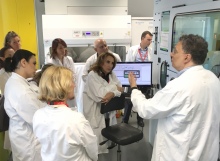Professor Michael Schneider elected a Fellow of AAAS

This week Professor Michael Schneider has been named a Fellow of the American Association for the Advancement of Science (AAAS).
Head of Heart Science at Imperial’s National Heart and Lung Institute, Professor Schneider has been recognised; ‘For distinguished contributions to the field of molecular cardiology, particularly for advances in basic heart failure research, cardiac stem cell biology and regenerative medicine’.
Reacting to his election, Professor Schneider said: ‘I am very proud of this recognition. The AAAS is among the leading organisations for professional scientists in the US and publishes the leading US journal in the field, equivalent to Nature in the UK. My ‘breakthrough’ paper as a young assistant professor was published in Science, making this newest recognition from the society very welcome indeed.’
Mending broken hearts
As Director of Imperial’s British Heart Foundation Centre of Research Excellence, Professor Schneider leads research into finding a way to repair damaged heart muscle, using dormant adult heart stem cells. Damage to the heart can happen when cells are starved of oxygen and die in a heart attack, or when stressed by increased workload. If enough cells are affected, this can lead to heart failure, which at present cannot be reversed.
In research funded by the Wellcome Trust, he has also worked to prevent heart muscle from being damaged during heart attacks: “I am especially proud of this work, as many efforts in this space - called ‘cardioprotection’ - have failed in the clinic. For this reason, I used human cardiac muscle cells, made from pluripotent stem cells, as the platform from the beginning, for target validation and compound development."
“Even before starting to make a drug, much less testing it in costly clinical trials, I first proved I could rescue human heart muscle cells from dying by silencing the gene for one stress-activated protein that causes cell suicide. Now we have compounds that do the same thing, and have shrunk heart damage in mice by nearly 70 per cent. Continuation of this work could take me back from the bench into human trials by 2020.”
 One of the main ways that adult cardiac stem cells improve the heart is thought to be through secreted signals they emit in the very first days after grafting. Stem cells injected into damaged heart tissue do not live for long, but their benefits can last weeks or months.
One of the main ways that adult cardiac stem cells improve the heart is thought to be through secreted signals they emit in the very first days after grafting. Stem cells injected into damaged heart tissue do not live for long, but their benefits can last weeks or months.
“We know secreted signals are ‘enough’, because cardiac stem cells from a mouse can keep human ones from dying in the lab, when separated from them by an impenetrable membrane with 1 micron pores. We are now testing the hormone-like proteins emitted by our cells, to see which best lead to heart muscle cell survival.”
Transatlantic links
Born and educated in the United States, and with a research career that already spans more than 30 years, for Professor Schneider this latest American honour further reinforces a life intimately connected to both sides of the Atlantic.
“London is the best city in the world for me and for my wife, who landed on her feet here as Head of Learning for the Royal Academy of Arts. But, at one level, we are adoptive Texans, having raised our sons there, who still live in Houston and in Austin. Scientifically, it’s a small world, and we collaborate especially with colleagues at Stanford for our stem cell work, and with the Duke Clinical Research Institute to pave the way for our clinical trials.”
About AAAS
Election as a AAAS Fellow is an honour bestowed upon society members by their peers; a tradition that began in 1874. Founded in 1848 to 'advance science and serve society', AAAS includes nearly 250 affiliated societies and academies of science, serving 10 million individuals. The world’s largest general scientific society, it is perhaps best know as the publisher of the journal Science.
This year 391 members have been awarded this honor by AAAS because of their scientifically or socially distinguished efforts to advance science or its applications. New Fellows will be presented with an official certificate and a gold and blue (representing science and engineering, respectively) rosette pin on Saturday 18 February at the AAAS Fellows Forum, during the 2017 AAAS Annual Meeting in Boston, Massachusetts, USA.
Article supporters
Article text (excluding photos or graphics) © Imperial College London.
Photos and graphics subject to third party copyright used with permission or © Imperial College London.
Reporter
Mr Al McCartney
Faculty of Medicine Centre